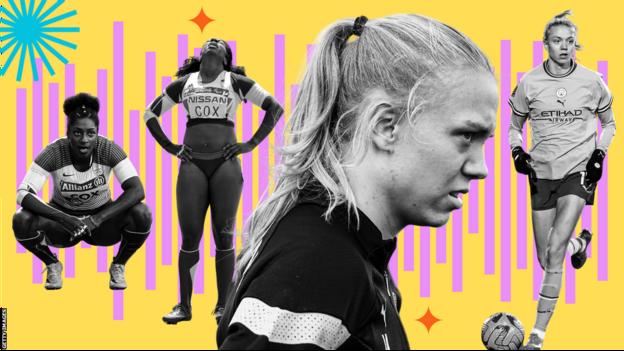Kadeena Cox and Esme Morgan on the mental impact of injuries

Paralympic champion Kadeena Cox knows more about injuries than most.
Ask licensed physical therapist Cox about the mental impact and she can cite a long list of hamstring ruptures, serious knee problems, Achilles tendon problems and a concussion that happened at inopportune moments.
A knee injury kept her out of the 2018 Commonwealth Games. She battled through Achilles tendon pain to reach the 2021 Tokyo Paralympics.
The dual athlete underwent hip surgery three months ago and now needs to regain fitness in time for the World Para Athletics Championships in July and the World Para Cycling Track Championships in August.
So if you’re researching the psychological effects injuries can have on athletes, she’s the perfect resource.
Cox discusses Women’s Sport Matters – a Sports Desk podcast special produced with the Open University – and describes it as “devastating” to get injured before a big event.
“You work so hard to get to these big championships and one little wrong step and that’s it, you set yourself back,” explained the 32-year-old.
“It can be really hard to deal with if you don’t have the right support around you.”
Trying to train for the Paralympics despite an Achilles tendon injury was “the toughest three months” of Cox’s life.
She felt “a terrible stabbing pain” in her legs and says: “Every session I would walk away crying, do a lap around the track just wiping the tears away and then trying to collect myself and bring myself back inside.
“I did that for a couple of weeks and then I realized there’s a point where you have to stop pushing yourself like that or you mentally break down.”
Cox eventually made it to Tokyo and although limited track time meant she was unable to defend her T38 400m title, she added two cycling golds to her medal tally.
identity crisis
Footballer Esme Morgan is also familiar with injuries.
The Manchester City and England defender broke her leg during a game in 2022 and spent 12 months on the touchline.
During the operation, a 40 cm metal rod was inserted into her leg. In addition to the physical pain, Morgan was going through an identity crisis.
“I don’t think you can ever prepare for something like that,” says the 22-year-old.
“Ever since I was a kid, I’ve played soccer every day whenever I could. To suddenly find out you’re going to be out for a year… I was like, ‘What on earth am I going to do with my life?'”
Cox says she lost her identity when, after a promising early career as an able-bodied sprinter, she suffered a stroke and was diagnosed with multiple sclerosis in 2014.
After going from 10 sessions a week to a two-month bed rest, Cox remembers that period of her life as “the dark times.”
The Open University expert, Dr. Caroline Heaney says this is a common psychological impact of injuries.
“Whether you’re elite or junior, when you’re an athlete, sport is such an important part of who you are that it’s hard to deal with having that taken away from you when you’re injured,” she explains.
“You have these feelings of frustration, anger, depression, and anxiety — all of those things can be common.”
“I felt like a failure”
Wondering who you are when you can’t be an athlete isn’t the only problem.
Morgan and Cox both discuss the fact that injury rehabilitation is often more time-consuming and arduous than training.
Then there’s your speed at which you return to the competition.
dr Heaney stresses the importance of “appropriate and flexible goal setting” during an injury, and Morgan has a perfect example of how setting a goal that’s too firm can go wrong.
When she spoke to the surgeon, who, in her words, “would bang her leg back together,” he said her recovery would take 6-12 months.
Morgan took this in such a way that she could be back on the pitch in six months, in time for England’s historic Euro 2022 campaign.
What it actually meant was that her leg might have healed in six months, but wouldn’t be ready for everything she typically went through in a match.
“When I hit that five or six month mark and was still in pain just walking around, I felt like a failure for telling everyone I’d be back in six months and I was nowhere near in close to that target,” says Morgan.
Cox points out that sometimes you have to give up such goals for your future health.
“I want to get to these championships, but I have to make sure I recover so I don’t have to have hip replacements in 20 or 30 years,” she says.
dr Heaney emphasizes that both elite and amateur athletes must consider the psychological side of an injury as well as physical recovery.
And Cox says that despite so much experience, she still struggles with the mental aspect.
Morgan has some advice: “Mentally, this constant insecurity and questioning is difficult. What I’ve learned is to look back two weeks and reflect on how far I’ve come in that short amount of time.
“It would make the bad days easier.”
Sports Desk: Women’s Sport Matters is a special miniseries produced in partnership with the Open University. The four episodes cover periods; sportswear; the psychology of injuries and training habits. You can listen to them here.

